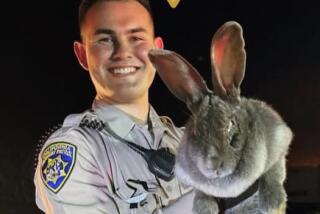Bunny Ownership Should Be More Than Spring Fling : Animals: Easter pets, which are often abandoned after the holiday, require long-term commitment.
- Share via
Theresa Schrieber has heard the horror stories about Easter bunnies that get dumped after their initial charm wears off.
She knows that some people buy rabbits, chicks and other Easter pets on a whim. But she and her husband are committed to responsible ownership of the bunny they are giving their two daughters on Easter Sunday morning.
“We’ve been talking about it for a long time,” said Schrieber, of Westminster, who was shopping for a bunny Thursday at Russo’s Pets in Santa Ana with her daughter Kristen, 5.
“The kids kept asking for it,” she said. “My husband and I had to decide is this something we’re going to undertake, because we have to do all the work. The kids won’t clean the cages or anything.”
Animal advocates say that many of the rabbits flooding pet stores during the April holiday never live past their first birthday.
“Close to 80% die or they don’t stay with their original owners,” said Laura Shortall, chapter manager for the Orange County House Rabbits Society, which finds homes for abandoned rabbits.
Several dozen baby bunnies usually land in local animal shelters within a week after Easter, according to Orange County Animal Control officials. Hundreds more are dumped in parks or on the street, where--defenseless--they die.
“It’s really irresponsible for the pet stores to push them at this season and tell people how easy it is to take care of rabbits,” Shortall said.
Several pet store owners objected to the gory picture painted by animal activists and said they teach responsible ownership to customers.
“I hear it all the time, but I don’t see the disaster, and I have yet to see it,” said Russo’s manager Bob Tetreault. “I don’t think the problem exists as big as before, when people did a lot of impulse buying and there wasn’t a lot of education.”
Tetreault and some other pet store managers said they are willing to take back unwanted bunnies and return them to the breeder. There is no refund, they said.
Michelle Freeman, assistant manager at the Mall of Orange’s Pet Pantry, said that employees there try to make sure customers are not buying rabbits and chicks “just for the novelty.”
*
“We explain how to care for them, and we try to weed out the people who buy them for the cuteness of them,” Freeman said.
Some pet store owners said they do not sell rabbits, chicks or ducks at Easter or any other time of the year because of the problem of irresponsible ownership.
Craig Walker, vice president of advertising at Petco, which has about a dozen stores in Orange County, said that the company does not sell rabbits--or even dogs and cats--because of the overpopulation problem.
“If you sell them, you’re adding to the problem,” Walker said.
Eileen Pinder, kennel manager at the Orange County Humane Society, recommends buying a stuffed animal instead of the real thing.
“It’s a shame,” Pinder said. “A couple months after Easter, we find they’re dumped in parks, and they don’t know how to survive in the wild. Often these animals die, starve or get hit by cars.”
Animal rights advocates said that because of children’s short attention spans, parents must be prepared to pick up the slack, because bunnies are full-grown in a matter of months and could live as long as 10 years.
“We don’t see the effects of Easter until June or July,” Shortall said. “Most pet stores sell baby rabbits at about 4 weeks old. That’s about four weeks too young. At about 3 months old, they are no longer these cute little things that little tiny kids can hold.”
Staff at the Santa Ana Russo’s, however, said their stock of about 30 bunnies were at least 2 months old when they first arrived from a local breeder. Those now on display are 3 to 4 months old.
Lt. Marie Hulett of Orange County Animal Control said that abandoning an animal is a misdemeanor and punishable by jail.
“If you want a pet, you can’t just stick it into a cage,” Hulett said.
She said the best route is to make a rabbit an active member of the household, providing it regular playtime and litter-box training.
“A pet’s personality depends on how an animal is cared for,” Hulett said. “If you handle them with care, they can be very adorable pets.”
(BEGIN TEXT OF INFOBOX / INFOGRAPHIC)
Rabbit Care
Here are some things you should consider if you are thinking about getting a pet rabbit:
* Housing: Bunnies need a roomy indoor cage, preferably 30 by 36 inches and 18 to 24 inches tall. It should have a resting board covering the wire bottom.
* Playtime: They should get regular free time for roaming and interaction with the family. Best times are mornings and evenings, when both owner and bunny are active.
* Outdoors: Rabbits can’t handle a lot of sun. They also can go into shock when approached by strange animals such as raccoons, owls or even cats and dogs.
* Litter box: It should contain dust-free litter, not the clumping kind.
* Food: Bunnies need fresh pellets, water and hay every day. Vegetables, fruits and grains (carrots, broccoli, mint, apples, bananas, rolled oats) should be given in small quantities.
* Grooming: Rabbits shed their coat four times per year; use a flea comb, and brush away excess fur.
Source: House Rabbits Society
More to Read
Sign up for Essential California
The most important California stories and recommendations in your inbox every morning.
You may occasionally receive promotional content from the Los Angeles Times.













